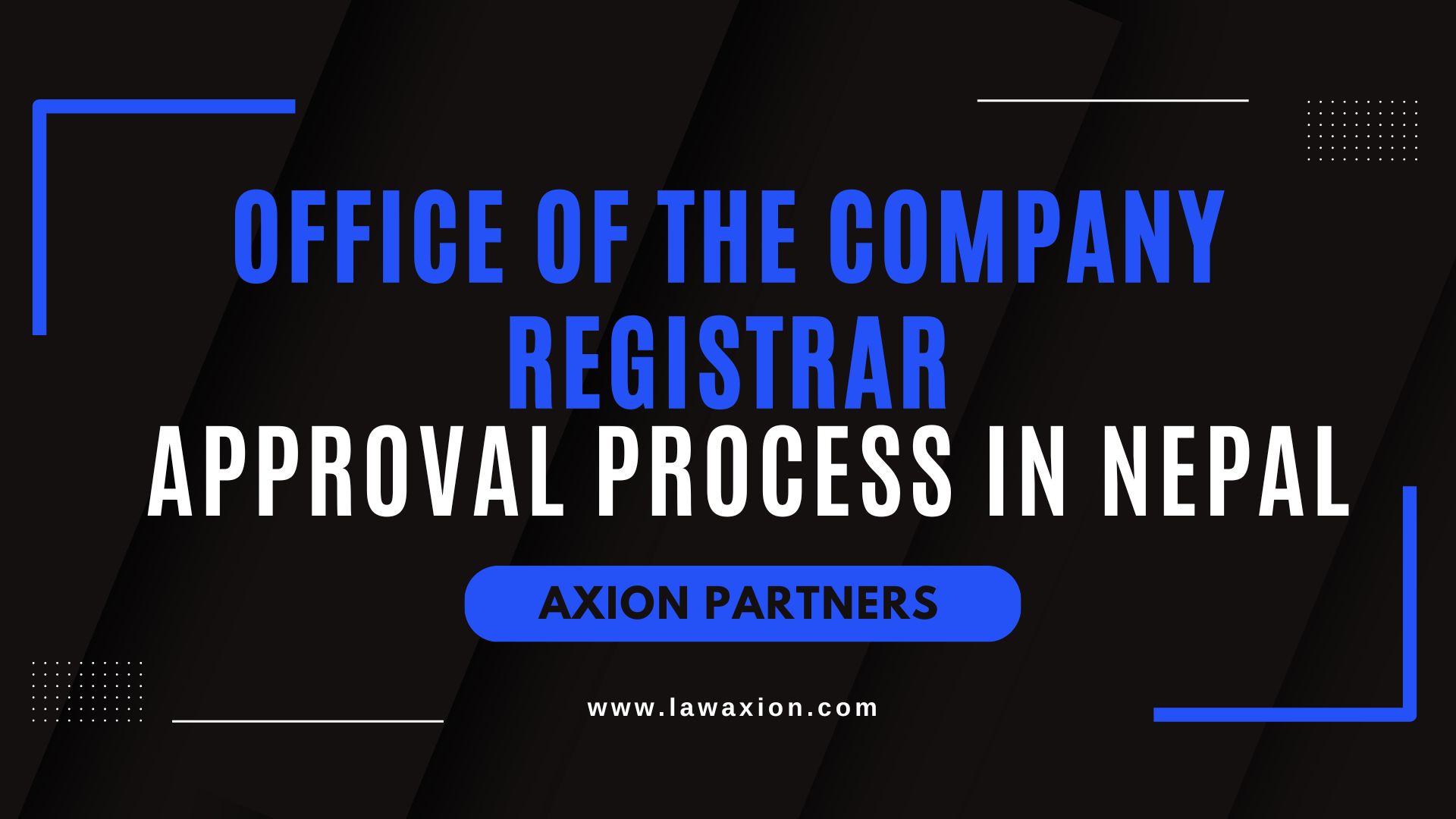Table of Contents
- 1 OCR Approval for Private Companies
- 2 Office of Company Registrar Approval Process in Nepal
- 3 OCR Approval for Public Companies and Profit Not Distributing Companies
- 4 OCR Approval for Foreign Branch and Contact Offices
- 5 OCR Approval for FDI Companies
- 5.1 FDI Policy Framework in Nepal
- 5.2 Sectoral Regulations and Restrictions
- 5.3 Time Frame and Cost Structure
- 5.4 Post-Registration Obligations
- 5.5 What is OCR approval and why is it required in Nepal?
- 5.6 How long does the OCR approval process typically take?
- 5.7 Where should companies submit their OCR approval applications?
- 5.8 What are the basic requirements for OCR approval in Nepal?
- 5.9 How much does OCR approval cost for different company types?
The Office of Company Registrar (OCR) serves as the primary regulatory authority for company registration and compliance in Nepal. Under the Companies Act 2063 (2006), OCR manages all corporate approvals, modifications, and regulatory oversight for businesses operating within Nepal’s jurisdiction.
OCR approval encompasses various business activities including company registration, structural changes, foreign investment approvals, and compliance monitoring.
OCR Approval for Private Companies
Private companies in Nepal frequently require OCR approval for various structural and operational modifications. The Companies Act 2063 mandates that significant changes to company structure must receive prior approval from the Office of Company Registrar.
Common Types of Private Company Approvals Required from OCR
Private companies typically seek OCR approval for several key modifications:
- Name Change: Companies must obtain OCR approval before changing their registered name
- Location Change: Relocating registered office requires formal OCR notification and approval
- Share Transfer: Transfer of shares exceeding certain thresholds needs OCR clearance
- Ownership Change: Significant ownership modifications require regulatory approval
- Objective Change: Altering company objectives or business activities needs OCR consent
Requirements for Private Company Modifications
The Companies Act 2063 establishes specific requirements for private company modifications. Companies must demonstrate legitimate business reasons for proposed changes and ensure compliance with existing regulations.
Key requirements include maintaining minimum share capital, ensuring proper documentation, and obtaining necessary clearances from relevant authorities. Companies must also ensure that proposed changes align with Nepal’s foreign investment policies and sectoral regulations.
Office of Company Registrar Approval Process in Nepal
- Step 1: Preliminary Assessment and Documentation Preparation
- Step 2: Application Submission to OCR
- Step 3: OCR Review and Verification Process
- Step 4: Approval Decision and Certificate Issuance
- Step 5: Post-Approval Compliance and Implementation
Step 1: Preliminary Assessment and Documentation Preparation
Companies must conduct thorough assessment of proposed changes and prepare comprehensive documentation. This includes reviewing existing company documents, identifying required modifications, and ensuring compliance with applicable laws. Companies should consult legal advisors to understand specific requirements for their proposed changes.
Step 2: Application Submission to OCR
Submit formal application to OCR with complete documentation package. Applications must include prescribed forms, supporting documents, and required fees. Companies should ensure all documents are properly notarized and translated into Nepali where necessary.
Step 3: OCR Review and Verification Process
OCR conducts detailed review of submitted applications and supporting documents. The review process includes verification of company compliance history, assessment of proposed changes, and evaluation of legal requirements. OCR may request additional information or clarifications during this phase.
Step 4: Approval Decision and Certificate Issuance
Upon satisfactory review, OCR issues approval certificate for requested modifications. The certificate specifies approved changes and any conditions or restrictions. Companies receive updated registration certificates reflecting the approved modifications.
Step 5: Post-Approval Compliance and Implementation
Companies must implement approved changes within specified timeframes and maintain ongoing compliance with OCR requirements. This includes updating company records, notifying relevant authorities, and ensuring continued adherence to regulatory obligations.
Documents Required for Office of Company Registrar Approval
Essential documents for OCR approval include:
- Company registration certificate and memorandum of association
- Board resolution approving proposed changes
- Audited financial statements for previous fiscal years
- Tax clearance certificates from Inland Revenue Department
- Share transfer agreements (if applicable)
- Updated articles of association
- Proof of registered office address
- Identity documents of directors and shareholders
OCR Approval for Public Companies and Profit Not Distributing Companies
Public companies and profit not distributing companies face additional regulatory requirements under Nepal’s corporate law framework. The Companies Act 2063 and Securities Board of Nepal regulations establish comprehensive oversight mechanisms for these entities.
Regulatory Framework for Public Companies
Public companies must comply with enhanced disclosure requirements, corporate governance standards, and shareholder protection measures. The Securities Board of Nepal (SEBON) works alongside OCR to ensure proper regulation of public companies and capital market activities.
Special Considerations for Profit Not Distributing Companies
Profit not distributing companies, including non-governmental organizations and social enterprises, must demonstrate their non-profit nature and social objectives. These entities receive special treatment under Nepal’s tax laws and regulatory framework.
Requirements for Public Company Approvals
Public companies must maintain higher standards of corporate governance, financial reporting, and stakeholder communication. Key requirements include:
- Minimum paid-up capital as specified in relevant regulations
- Independent director appointments
- Regular financial audits by certified auditors
- Compliance with securities regulations
- Proper disclosure of material information to shareholders
OCR Approval for Foreign Branch and Contact Offices
Foreign companies seeking to establish branch offices or contact offices in Nepal must obtain specific approvals from OCR and other relevant authorities. The Foreign Investment and Technology Transfer Act 2075 (2019) governs foreign business operations in Nepal.
Branch Office vs Contact Office Distinctions
Branch offices can engage in commercial activities and generate revenue, while contact offices serve liaison purposes only. This distinction significantly impacts approval requirements, operational permissions, and regulatory obligations.
Regulatory Compliance for Foreign Offices
Foreign offices must comply with Nepal’s foreign exchange regulations, tax obligations, and reporting requirements. The Nepal Rastra Bank oversees foreign exchange aspects, while OCR manages corporate compliance matters.
Approval Process for Foreign Branch Offices
Foreign branch offices require comprehensive approval covering business activities, capital requirements, and operational parameters. The approval process involves multiple government agencies and requires demonstration of economic benefits to Nepal.
OCR Approval for FDI Companies
Foreign Direct Investment (FDI) companies represent a crucial component of Nepal’s economic development strategy. The Foreign Investment and Technology Transfer Act 2075 establishes the legal framework for FDI approvals and operations in Nepal.
FDI Policy Framework in Nepal
Nepal’s FDI policy encourages foreign investment in priority sectors while protecting domestic industries and national interests. The Department of Industry serves as the primary approval authority for FDI projects, working closely with OCR for company registration matters.
Sectoral Regulations and Restrictions
Certain sectors remain restricted or prohibited for foreign investment under Nepal’s FDI policy. Foreign investors must carefully review sectoral regulations and ensure compliance with ownership limitations and operational requirements.
FDI Approval Requirements
FDI companies must meet specific criteria including:
- Minimum investment thresholds as specified in regulations
- Technology transfer commitments where applicable
- Employment generation targets for Nepali citizens
- Environmental compliance certifications
- Sector-specific licensing requirements
Time Frame and Cost Structure
OCR approval timeframes vary depending on application complexity and completeness. Standard applications typically require 15-30 working days, while complex cases may take 45-60 days. Expedited processing options are available for additional fees.
Cost structures include government fees, legal consultation charges, and documentation expenses. Companies should budget appropriately for professional services and potential additional requirements during the approval process.
Post-Registration Obligations
Companies must maintain ongoing compliance with OCR requirements including annual return filings, financial statement submissions, and regulatory notifications. Non-compliance may result in penalties, suspension of operations, or cancellation of registration.
Regular compliance monitoring ensures continued good standing with regulatory authorities and maintains eligibility for various business benefits and incentives available under Nepal’s investment promotion policies.
What is OCR approval and why is it required in Nepal?
OCR approval is mandatory authorization from Office of Company Registrar for company registration, modifications, and compliance under Companies Act 2063, ensuring legal business operations in Nepal.
How long does the OCR approval process typically take?
Standard OCR approval process takes 2-10 working days for complete applications, while complex cases may require 10-20 days depending on documentation completeness and regulatory requirements.
Where should companies submit their OCR approval applications?
Companies must submit OCR approval applications directly to Office of Company Registrar headquarters in Kathmandu or designated regional offices with complete documentation and prescribed fees.
What are the basic requirements for OCR approval in Nepal?
Basic OCR approval requirements include complete application forms, company documents, board resolutions, financial statements, tax clearances, director identification, and payment of prescribed government fees.
How much does OCR approval cost for different company types?
OCR approval costs vary by company type and modification scope, ranging from NPR 5,000-50,000 plus professional fees, with additional charges for expedited processing services.





























